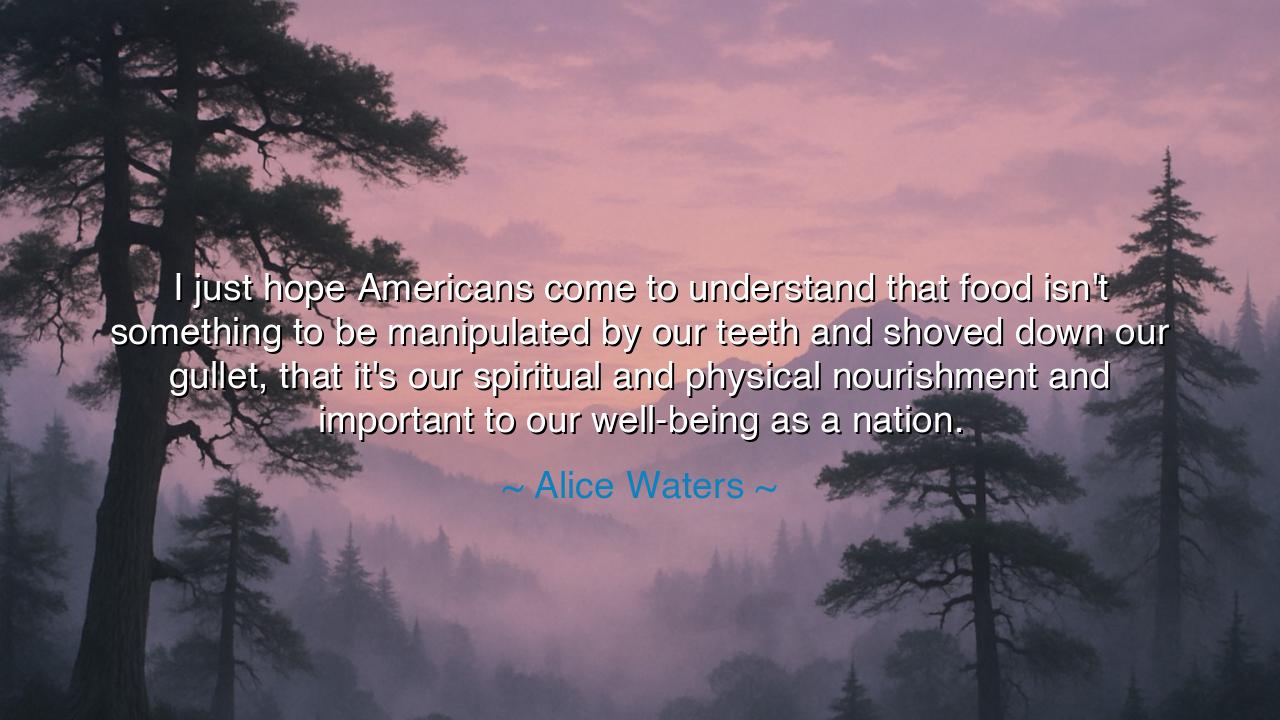
I just hope Americans come to understand that food isn't
I just hope Americans come to understand that food isn't something to be manipulated by our teeth and shoved down our gullet, that it's our spiritual and physical nourishment and important to our well-being as a nation.






The words of Alice Waters, the visionary chef and advocate of mindful eating, rise like a gentle yet urgent sermon for our age: “I just hope Americans come to understand that food isn't something to be manipulated by our teeth and shoved down our gullet, that it's our spiritual and physical nourishment and important to our well-being as a nation.” In these words, we hear not merely the voice of a cook, but the wisdom of a philosopher of the earth. She calls us to remember what we have forgotten—that food is not just sustenance, but a sacred covenant between human beings and the natural world. It is not something to be consumed in haste or indifference; it is the daily ritual by which we connect body to soul, and the individual to the community.
Alice Waters, founder of the legendary Chez Panisse in Berkeley, spoke these words in a time when the modern world had begun to lose its intimacy with the land. In the twentieth century, the rise of industrial agriculture and fast food stripped nourishment of its spirit. Meals became mechanical, hurried, detached from the rhythms of soil, season, and care. Waters saw this as a grave illness—not only of diet, but of culture and conscience. Her call was not simply to eat better, but to live more consciously. To eat without reverence, she warned, was to forget our roots as living beings in relationship with the earth that feeds us.
When she speaks of spiritual nourishment, she recalls an ancient wisdom that has guided civilizations for millennia. In every culture of the past, food was more than sustenance—it was ritual. The Greeks offered bread and wine to the gods; the Buddhists blessed their rice with gratitude; Indigenous peoples across the world thanked the spirit of the animals and plants they consumed. These acts were not superstition—they were acknowledgments of connection, humility, and balance. To eat mindfully was to live in harmony with the cosmos. Waters’ words echo this ancient understanding: that the act of eating is an act of communion, both sacred and political, both intimate and communal.
Yet in the modern age, the act of eating has been profaned. Fast food, convenience meals, and industrial farming have made food a commodity rather than a living gift. We eat not with gratitude, but with distraction. We eat not from the land, but from machines. And in doing so, we starve the spirit, even as we fill the body. Waters’ lament is not simply about cuisine—it is about culture. For when a people forget the sanctity of their food, they lose the thread that ties them to one another and to the living world. In her eyes, this is not just a dietary crisis but a national one, for the health of a nation begins at its table.
Consider the story of Mahatma Gandhi, who saw in food both a spiritual practice and a tool of liberation. Through fasting, he purified not only his body but his will. Through the promotion of simple, local eating, he resisted the machinery of empire. He understood, as Waters does, that food is power, and that what and how we eat shapes the destiny of nations. In our time, to eat with awareness—to choose food grown with care, prepared with love, and shared in community—is to engage in quiet revolution. It is to heal what industrial greed and spiritual neglect have torn apart.
The spiritual nourishment Waters speaks of is not something abstract or mystical—it is the peace that comes from connection, the gratitude that transforms consumption into celebration. When we pause before eating to honor the hands that sowed, harvested, and prepared, we awaken to the truth that life feeds on life, and every meal is a gift. When we share food with others, we remember that community is built not through wealth or power, but through generosity and common need. The meal becomes an altar, and eating becomes an act of grace.
Lesson and Practice:
Eat as if your food were sacred, for it is. Slow down, and let each meal remind you of your place in the great circle of life. Seek food that is alive—grown with care, free from exploitation—and let gratitude accompany every bite. Cook for others, and let your table become a place of peace and conversation. Remember that food is not only fuel but fellowship, not only a pleasure but a prayer. As Alice Waters teaches, when we eat with reverence, we nourish not only the body, but the soul—and through this, we restore the health of our people, our planet, and our shared humanity.






AAdministratorAdministrator
Welcome, honored guests. Please leave a comment, we will respond soon